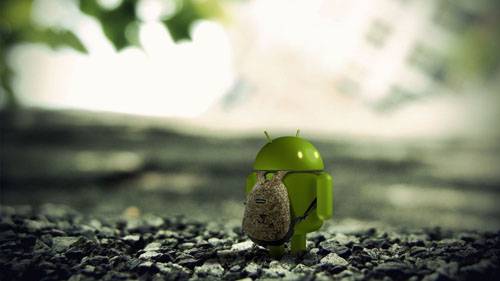- Qualcomm Launches Snapdragon 4 Gen 2 Mobile Platform
- AMD Launches Ryzen PRO 7000 Series Mobile & Desktop Platform
- Intel Launches Sleek Single-Slot Arc Pro A60 Workstation Graphics Card
- NVIDIA Announces Latest Ada Lovelace Additions: GeForce RTX 4060 Ti & RTX 4060
- Maxon Redshift With AMD Radeon GPU Rendering Support Now Available
The Android Dilemma – An Open Platform Open to Piracy?

Unlike its leading competitor, iOS, Android is about as open as a traditional desktop OS. As such, piracy is no stranger here, and some developers speculate that the situation is made worse by the fact that it is “open”. We analyze that and other thoughts, and try to evaluate whether or not closing Android would solve anything.
Page 2 – A Convenient Excuse, Payment Problems & Final Thoughts
Piracy Has Nil To Do With Convenience
The most popular excuse I’ve seen explaining why people pirate is that it’s “convenient”. It’s more convenient, somehow, to scour the Web for a pirate copy than to just pay for it. And apparently we’re living in an age where we all need to be spoon-fed our purchases, because companies can never make the process “easy enough”.
I believe that excuses like these, for the most part, are total BS. It’s never been easier or more convenient to purchase an app through Google Play, Apple’s App Store and others. You visit the site, click “Purchase” on an app, verify the charge and then wait for it to download and install. The only way the process could be any more convenient is if someone else did it for you.
Some refuse to believe that people who pirate, “just do”. It’s not about convenience, though it might be about funds, or the lack of. Pirating an app on Android is easy, as detailed above, but it still requires you to spend a lot of time rummaging through shady sites trying to find a download link that actually works, battling pop-ups galore and potentially, malware if you play your cards right.
When a game costs a mere $1, there’s no greater convenience than to just push a couple of buttons and have it download. But take the experience of Czech developer Madfinger Games, responsible for some of the best-looking mobile games out there, Shadowgun and Dead Trigger. Released last month, Dead Trigger was being sold for a dollar and is then supplemented further with the sale of optional in-game purchases. Sounds reasonable enough.
According to a recent interview, however, Madfinger found that a staggering 80% of Android Dead Trigger installs were pirated, despite the modest pricing. According to the developer, its $5 Shadowgun had even higher piracy rates. For a game that has Xbox 360-esque graphics and costs about 1/10th of a new game on that platform, these rates are pretty alarming.
While Madfinger seems to be targeting Android, it can’t be argued that all mobile and desktop platforms suffer the same issue. Android just happens to make it easier than the others.
Part of the Problem is Google
On the topic of conveniences, giving people more than one option to pay is a good thing. This is an area where Apple sets a perfect example, and one where, for some reason, Google is slow to catch on.
As far as Google’s concerned, “Add a payment method” means “Add a credit card”, or a debit card that acts as a credit card. PayPal, one of the world’s leading payment processors isn’t an option, nor are popular overseas competitors. A simple debit card is not permitted, and best of all, gift cards for Google Play don’t exist.
That matters. Maybe not to you, but it does to millions of others. When there’s talk of a new “hack” on some major Internet service every other day, you might understand why some people don’t like using their credit card for online purchases more often than necessary, or they’d at least like to keep it exclusive to a service like PayPal. Of course, Google competes with PayPal, offering a less-stellar option, so consumers lose.
Apple’s gift cards are available everywhere. You can use real cash to purchase some credit, then punch the code into your account. This allows people the best possible option to keep their financial information safe, and Google seems to not care. Maybe we’ll see Google Play cards in time, but as the service has been around quite a while, I’m not counting on that day being soon.
Such payment options would also help those who either don’t have a credit card by choice, or can’t have one due to their age. These are people who cannot legally purchase apps from Google, because the option just doesn’t exist. Even I, someone with a credit card, would prefer going the gift card route.
But… Let’s Keep Android Open
That title might seem a tad ironic given some of the things that have been said, but hear me out.
Piracy on Android is as easy today as it always was, but with Madfinger’s decision to make Dead Trigger free, the issue is once again making the rounds. Some, as a result, are calling for Google to “close” Android, stating that an open system is a system where developers can’t run a reliable business.
This mindset is flawed. Windows, OS X and Linux are just as “open” as Android is, and not surprisingly, piracy runs rampant as a result. But the logic that an open system isn’t good for business is false, as these desktop OSes prove. What is good for business? Developing apps people want. As the adage goes, would you rather 90% of 1,000 people or 10% of 100,000 purchase your app?
It’s been argued that there are some benefits to piracy, but all in all, it’s not great. But it’s something that’s not going to go away just because a company puts in an arbitrary roadblock. Take a look at iOS. It’s locked down, but many people root their phones in order to… you guessed it, pirate. The same thing would happen on Android. If you want to pirate, you’re going to pirate. Any scheme a developer tries to pull to make an app difficult for pirates to crack is likely to affect the people they should care about most – their customers.
The beauty of Android is that it is open. Unlike iOS users, I can set a default Web browser. A default image viewer. A default text editor – and so on. I can completely overhaul Android’s front-end, without rooting the device. I have the option to customize the device to my heart’s content. I can install whatever apps I want to, once again, without rooting. Being open sure sounds horrible, doesn’t it? Would we risk closing Android so developers can see their product get pirated just the same?
I’m a believer that “one pirated copy” != “one lost sale”. People who pirate tend to do so because they can, or because they genuinely don’t have the cash to spare. Piracy on Android is no different than piracy on any other platform. As mentioned above, it just happens to be a bit easier on Android as the result of its consumer-beneficial openness (not that Android is “open” as in open-source, but that’s another topic).
As computing history has proven time and time again, closing Android won’t accomplish a thing, but it will have other regrettable downsides.
Discuss this article in our forums!
Have a comment you wish to make on this article? Recommendations? Criticism? Feel free to head over to our related thread and put your words to our virtual paper! There is no requirement to register in order to respond to these threads, but it sure doesn’t hurt!
Support our efforts! With ad revenue at an all-time low for written websites, we're relying more than ever on reader support to help us continue putting so much effort into this type of content. You can support us by becoming a Patron, or by using our Amazon shopping affiliate links listed through our articles. Thanks for your support!







